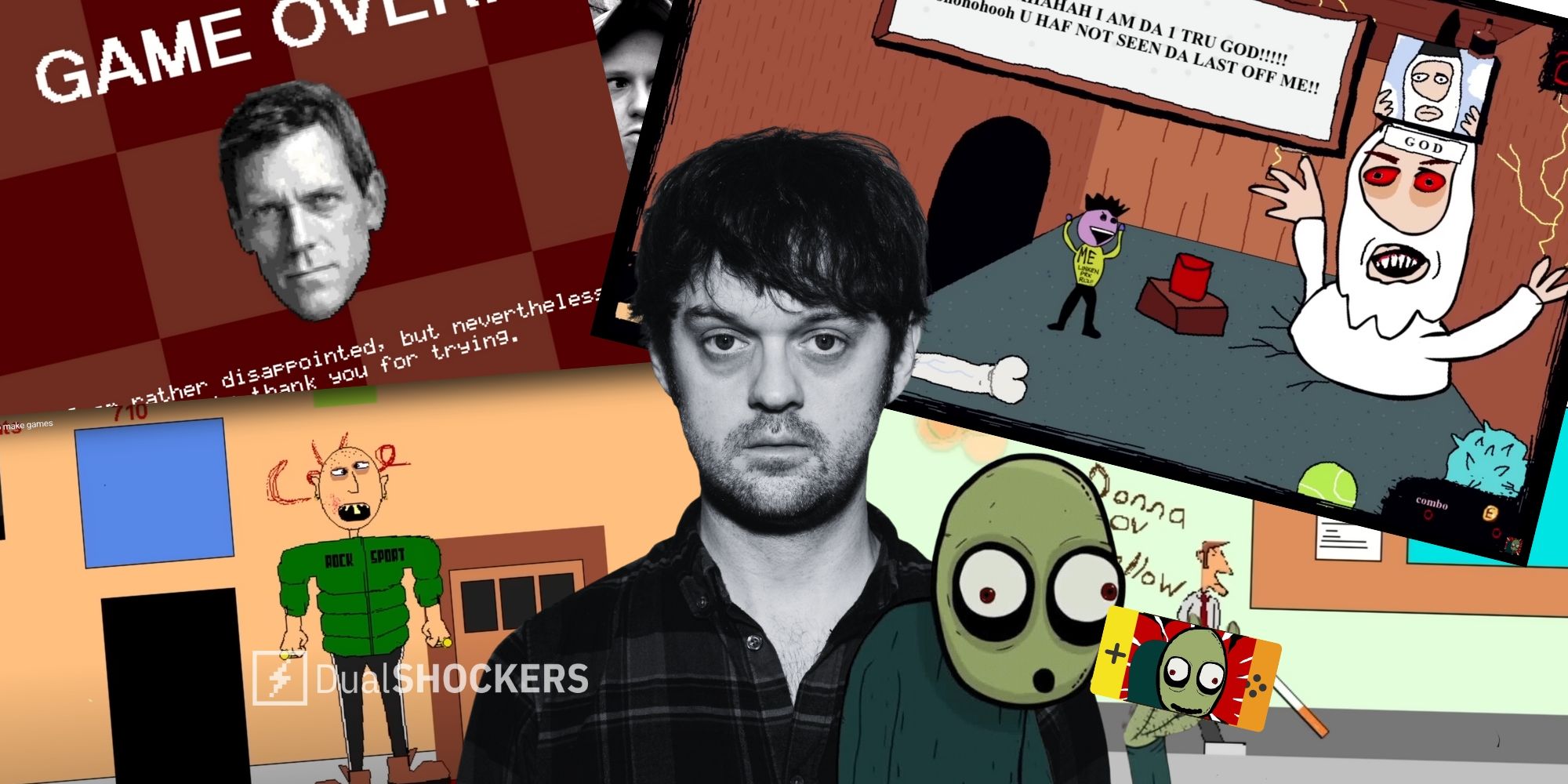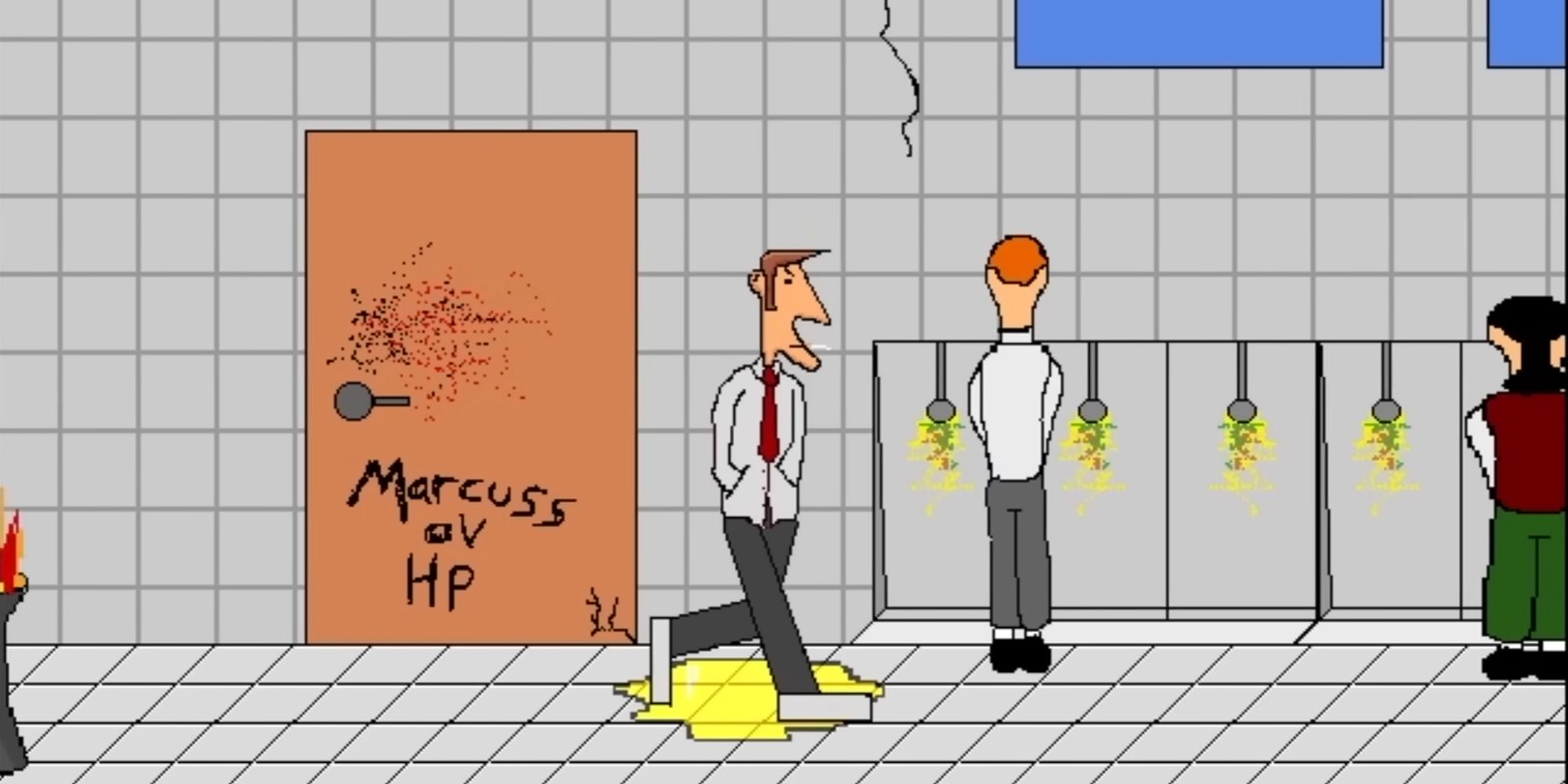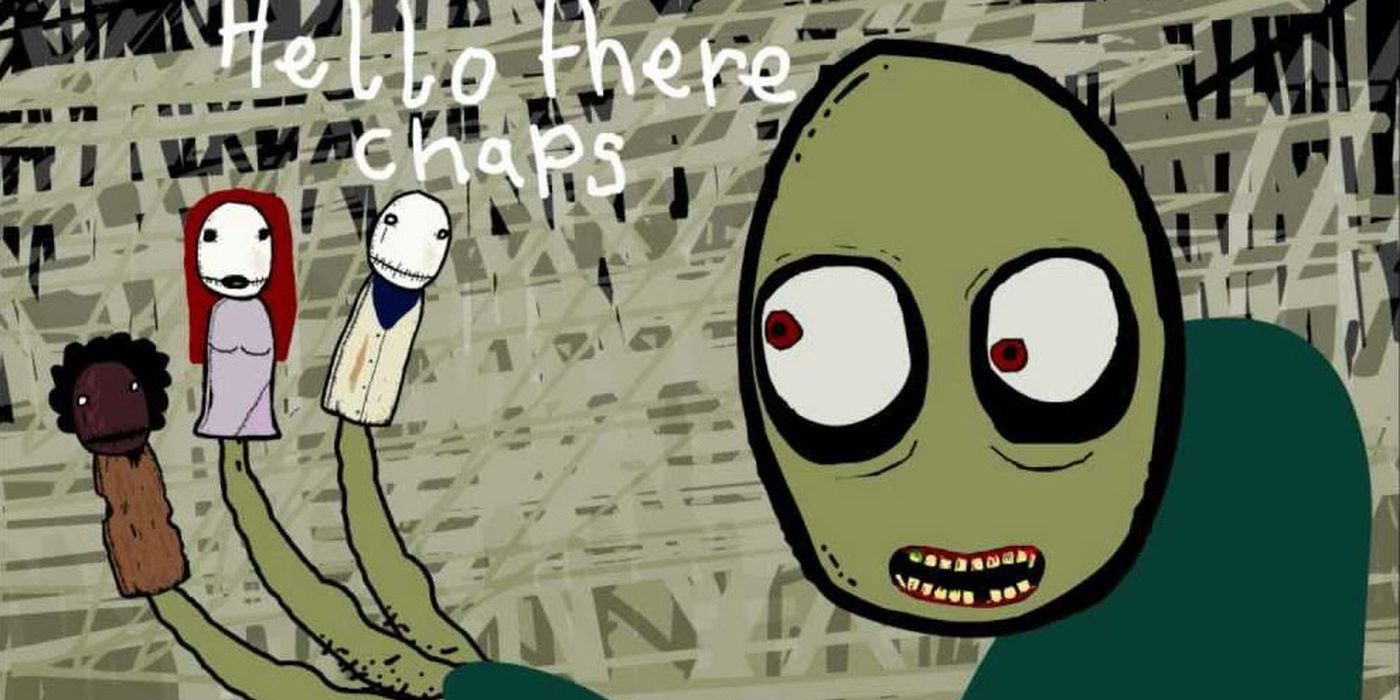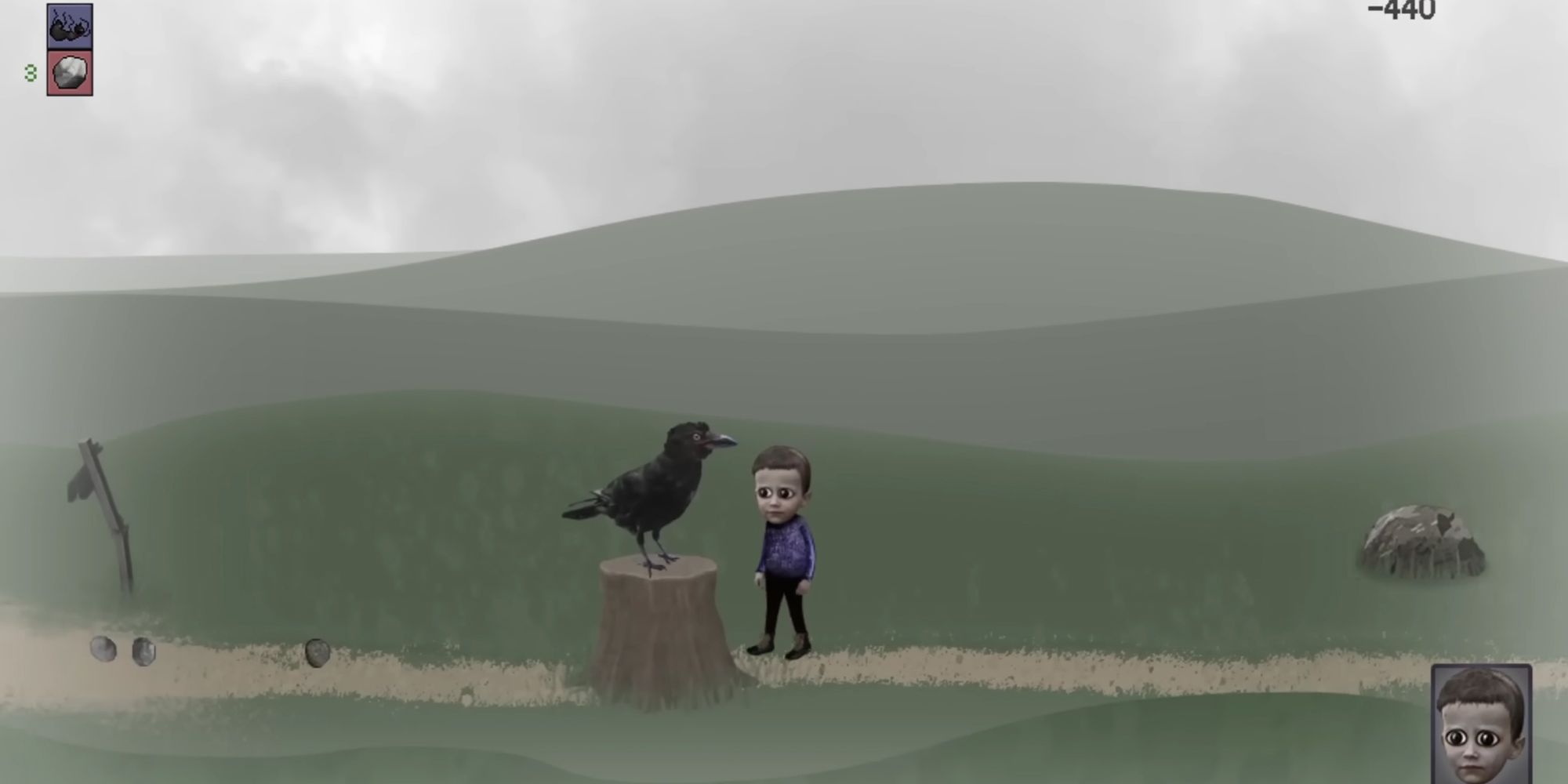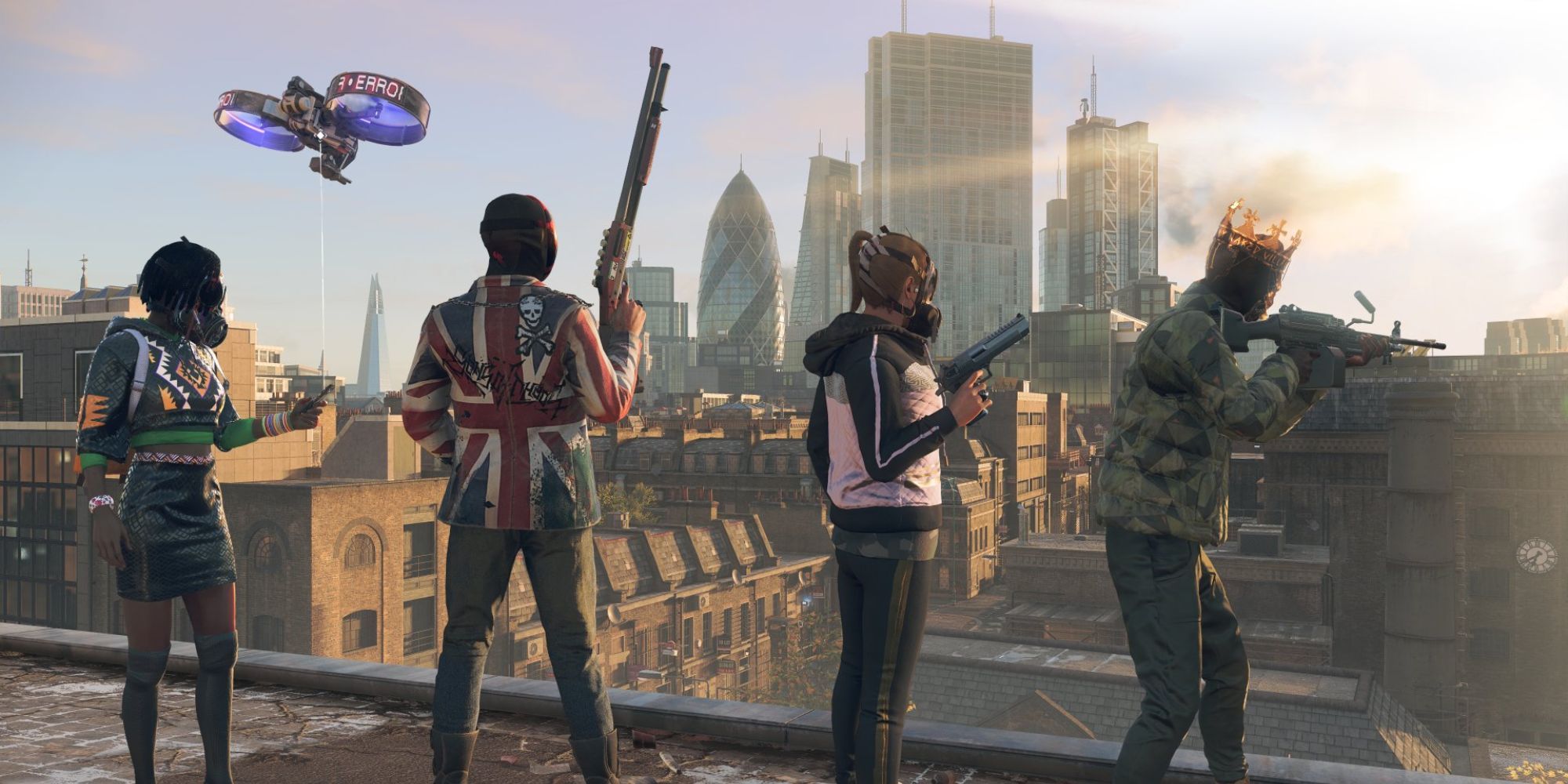The early 2000s were a golden era in gaming, when the likes of Silent Hill 2, GTA 3, Metal Gear Solid 2, and The Legend of Zelda: Wind Waker were propelling the medium in terms of storytelling, graphics, and open-world design, moving 3D graphics from their blocky infancy towards a level of verisimilitude that still resonates when we play those games today.
But it was also a fruitful period for David Firth, animator and creator of cultishly popular surreal cartoons including Salad Fingers, Burnt Face Man, and Jerry Jackson. Back in the early 2000s, Firth was creating games like Hugh Laurie’s Fire Rescue 2 (the first and only game in the series), where you play the titular actor putting out fires around Northern Ireland during the troubles while collecting BAFTA pickups and avoiding knife-wielding locals. He created Psycho Bitch Killer, a gory chainsaw rampage inspired by a little-known Acorn Archimedes game called Dinosaw.
And who could forget Mel Gibson’s Safari 3, which was actually a widely available Flash game, has a well fleshed-out (and totally made up) Uncyclopedia page, and according to Glitchwave was the 504th best-ranked game of 2005. “What games did I beat?” Firth asks me curiously when I tell him. I confessed that I hadn’t clicked all the way through to the 13th page of the rankings, so I didn’t know at the time, but having now done the legwork, I can confirm that Mel Gibson’s Safari 3 ranked just above Aeon Flux and Scooby-Doo! Unmasked that year. Not bad at all.
Firth set aside his adolescent game-making pursuits when he found success in the mid-2000s with his now-cult classic animation Salad Fingers, which led to myriad other weird works from the British creator (special shout-out to MC Devvo). More recently however, Firth has picked up his game-making tools once more, and I sat down with him to, well, chat games really—past and future.
Firth’s story with gaming is one many 90s kids can relate to. Games were expensive and digital distribution was non-existent, so he’d often settle for one game to last him from his birthday through until Christmas, when he’d receive the next one. “I had Kevin Keegan’s Player-Manager, which sounds as boring as it is,” he recalls. “It had this bad pixel drawing—not even a digitised photo—of him on the cover, but I still played season after season of it because that’s all there was.”
“One of my friends had a game-making software on Amiga and he never used it, and I just thought ‘that’s all I’d do if I had that!’”
It was a challenging yet exciting time to be a gamer—where the price of entry and general inconvenience of gaming was constantly grappling with the sheer excitement that the rising tide of home consoles brought with it. Even something as simple as picking up a game where you left off was no easy task on the NES. “I remember Battle of Olympus on the NES,” he begins. “They gave you a password, but it’d be a huge paragraph and it never worked. Like, one letter was wrong every time, the ‘Ls’ looked like ‘1s,’ and the whole thing was in italics so it was even harder to see.”
It was also a time when rudimentary controller d-pads boldly tried to mimic mouse cursors. “I really liked Maniac Mansion on the NES, but it kind of hurt to play because you’d be like ‘Oh yeah, move the cursor all the way down there to pick that up. Nope, that didn’t work. Oh, now I need to move the cursor all the way across again.’”
Like many of us, Firth wasn’t deterred by the tribulations of 90s gaming, and would get involved in clandestine sessions on classroom computers, despite those computers being anything but gaming machines. “Schools [in the UK] took this huge gamble on the Acorn Archimedes, which completely bombed,” Firth remembers. “You never saw these computers outside of school, no one had one, and all my school life we were on them, even in the year 2000 with Windows around. There was no software that was compatible with them and they were just so ancient.”
One piece of software that did work with the Archimedes, however, was the brilliantly named Dinosaw, a surprisingly brutal 2D platformer that saw you play a shades-wearing caveman who ran around tearing dinosaurs up with a chainsaw. “I thought one of the kids had made it and I thought ‘oh, you can make your own games,’” Firth tells me. “One of my friends had a game-making software on Amiga and he never used it, and I just thought ‘that’s all I’d do if I had that!’”
Firth’s forays into game-making began with the ubiquitous 90s game-making software Klik & Play, before he graduated to the newer version of the tool, Games Factory. He charts many of his creations with the software in the below video.
Eager to move into the realm of 3D, Firth convinced his mum to buy him proper 3D game-making software at PC World. Within a couple of weeks of using the software, Firth realised that he’d reached the limit of his technical capability. “I got home, installed it, and it was like ‘Introduction to C++,” he begins. “I was like ‘wow, OK, so there’s classes and, what, variables? What’s an integer? You store data in the string, and… sorry, when does it get to the game?’ And I’m just thinking ‘How do I make games with this?’ That was it to me. That was basically where I decided ‘Can’t do this, I’ll make cartoons instead.’”
That, of course, was a sound career move. Salad Fingers, following the eerie adventures of the emaciated spindly-fingered titular hero with a penchant for rusty spoons, launched almost at the same time as Youtube, and became a hit on the platform. Today, Firth’s Youtube channel has nearly 2 million subscribers, where you’ll find the full spectrum of his weird works. There’s a satirical news sketch called The News Hasn’t Happened Yet (‘Brass Eye meets Aphex Twin,’ is how I put it) involving Firth’s face superimposed onto the faces of major news stories. There are Lynchian live-action sketches, one-off episodes, and a series called ‘Sock’, based on Firth’s dreams.
In 2019, Firth even collaborated with Justin Roiland’s studio Squanch Games to make a trailer for the game Trover Saves the Universe in 2019. Of course, the trailer had absolutely nothing to do with the game until right at the end when a naked man with frog feet jumps out of a character’s crotch, holding a copy of the advertised game. I’m sure Rik & Morty creator Roiland would’ve appreciated the uncanny randomness.
Firth’s passion for gaming never subsided. He regales me with tales of using Parsec to play retro multiplayer games with friends—chief among them all five Super Bomberman iterations for the SNES, and a little-known Bomberman-like game called Poy Poy that involves people throwing items (and each other) at each other. But it’s only during the pandemic that Firth picked up game-making again. “The pandemic didn’t really change what I do day-to-day because I’m at home making stuff,” Firth begins. “But something about no one being at work almost gives you permission to take a few days off and do something different.”
So Firth picked up Clickteam Fusion (essentially the latest version of Klik & Play), and has since been dabbling with 2D games once again. The difference between now and the early 2000s is that the gaming scene is rife with indie developers making 2D games, and it’s far more feasible for a solo developer like Firth to actually bring their games to market. That, and Firth understands a lot more about how to set a scene. “It occurred to me that back in the day I had no concept of creating an atmosphere,” he muses. “That’s something I learned when I started animating and making my own music, so it got me curious what it’d be like if I made a more atmospheric game.”
One of Firth’s current projects is an “as-yet untitled somewhat ambient moody adventure-slash-exploration game,” which sees you control a boy lost on the mist-shrouded Yorkshire Moors. In the video above, we see the boy being pecked at by a crow, talking to ants, and fighting axe-wielding apes (big Limbo vibes for me). Firth insists, however, that this game is merely a side-project for now, and his main focus as games go is a chaotic, highly interactive platformer based on another of his famous creations, the delinquent boy Jerry Jackson.
Early footage shows the renowned miscreant running people over in a car, jumping on peoples’ heads in school, getting throttled by his topless mum, and fighting a ‘Manky Bird’ boss with a Souls-like health bar. Talking about the game, Firth seems delighted by the little details that make it fun. “There are certain layers you can add to a game that immediately elevate it,” he begins. “If you just add a few characters and a bit of dialogue, all of a sudden this simple platformer is now a world.”
We talk about interactivity in game worlds, and how to this day players get great pleasure out of seemingly pointless interactions, from stealing cars and seeing if you can turn natural features into jumps in GTA, to gathering all the cheese wheels in Skyrim. The Jerry Jackson game embraces the spirit of pointless interaction. “In the school, you can break everything—you can break the vending machine, you can knock the lights off, you can talk to people, bounce around on their heads if you want, or just bop them and they just kind of bleed and fall over,” Firth stops, seemingly pondering what all this means in the context of his game. “It just feels nice. It’s kind of crude and unnecessary, but in his world it seems necessary.”
“If you just add a few characters and a bit of dialogue, all of a sudden this simple platformer is now a world.”
Firth has a successful career as a solo creator, but with his relative inexperience in game design, I ask if he’d consider working with a studio should one approach him. “I’ve got this feeling I’d be annoyed at little things that I’d want changing, and I’d probably annoy them too much,” Firth tells me. “And if it was a big studio, then there’s a strong chance they’d lean towards this very particular set of cliches that I can’t stand in video games.”
He singles out Ubisoft’s open-world design, and in particular Watch Dogs: Legion, which reeled him in with its promise of an open-world London. “The way the characters talk, the way they lead into a quest, when you interact with the characters, and they talk like a 50-year-old thought kids talked like 10 years ago,” he says with distaste. “It’s like a bad BBC Three sitcom written about you but not by you.”
So it looks like that Firth-Ubisoft collaboration won’t be happening anytime soon.
And what if Firth had all the resources and game design know-how in the world? What would be his ‘dream game’? After suggesting the idea of a Salad Fingers in a fully 3D world (despite reminiscing about how bad the 3D South Park FPS for the N64 was back in the day), Firth segues into high praise for a certain Japanese studio. “When I think of the perfect game, I just think it’s the next FromSoft game,” he tells me. “You can tell they really care, they’re the absolute opposite of Ubisoft to me. You can tell every person working on those games is so invested in atmosphere, and making the perfect mechanics and perfect combat.”
As Firth talks admiringly about FromSoft, reminiscing about the majesty of the martian beach battle where you fight General Radahn (and how he cheesed the battle by spamming the summons at the start of the battle), he almost gets cowed by the developer’s accomplishments. “That’s the sort of thing that almost makes me not wanna make games. Like, how can I make a game like they can, that’s just got everything in it?”
It’s all in jest of course. Firth is not likely to be deterred because he’s a tireless creator, and even when he’s taking a break from his animation day job, he’s either creating music or creating games. “I don’t have many pastimes that aren’t in some way creative, apart from gaming,” he concludes.
Firth prefers not to put timelines on his gaming projects, because he doesn’t “want people asking about it in 10 years saying ‘where is it?’ and it’s not there.” He does, however, want to start bringing his games to Steam, starting with Jerry Jackson. He wants to get the game up to at least an hour in length first, and he reassures me that that game isn’t going to be following the recent spikes in game prices. “I’m not gonna charge £49.99. Make it a fiver or something.”
So you heard it here first, folks: the Jerry Jackson Video Game, coming not soon, but at some point (probably), maybe on Steam, and going for a fiver (or something).

